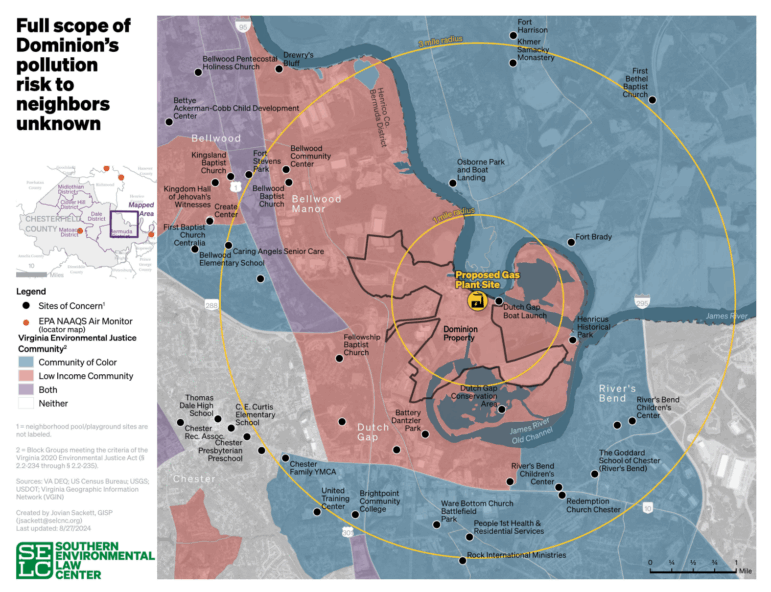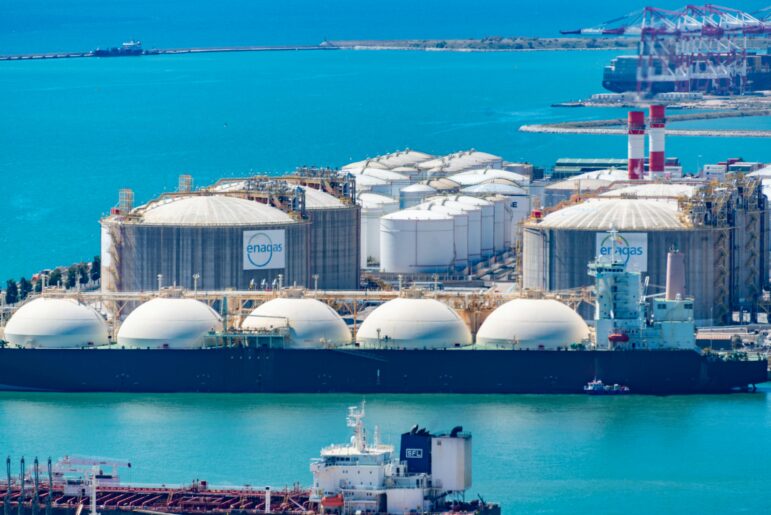Stop Dominion's Chesterfield Fracked Gas Plant
The Chesterfield Gas Plant would be the largest peaker plant In Virginia
The Chesterfield Gas Plant would be the largest peaker plant In Virginia
Dominion is proposing a massive new methane gas plant near the James River, consisting of four new generators totaling 1000 MW of installed capacity. This would be the largest “peaker plant” in Virginia – that is, a plant that generally runs only when there is high demand.
Although Dominion is calling this a “peaker” plant, it would run 3240 hours per year – 37% of the time. “Peaker plant” usually only operates a couple hundred hours per year. Dominion is intentionally misleading the public.

Sign the petition: Tell Virginia regulators to say NO to this new gas plant catastrophe!
Electricity generated by the proposed Chesterfield plant could cost up to 5 times more than solar. In a best case scenario, gas peaker plants generate electricity at a cost of $115 per MWh. Meanwhile, utility scale solar can generate electricity at a cost of only $24 per MWh. Continuing to build new gas infrastructure will lead to higher bills. Even when paired with battery storage, solar is still 2.5 times cheaper than gas peaking.
Per the 2020 Virginia Clean Economy Act, Dominion is bound to shift their generation mix towards zero-emission resources on a year-by-year basis. By 2045, their electricity mix must be 100% carbon free. New gas plants have an anticipated lifespan of 40 years, meaning Dominion’s gas plant would continue emitting carbon 22 years after the company is required to achieve zero emissions.
Dominion cannot build new carbon-emitting generation sources unless the company has met its Energy Efficiency Resource Standard (EERS) target – a 5% reduction by 2025, compared to 2019.
Dominion’s new plant would operate 37% of the time, emitting about 4,500,000,000 lbs of CO2 per year. That’s the equivalent of adding over 470,000 cars to the road each year. This would cause more than 6.5 square meters of Arctic sea ice to melt each year.
According to Dominion, the plant would create 226 jobs during construction and 35 jobs during the plant’s operation. At a low-end price tag of $600 million for the plant, an equivalent investment in energy efficiency would create 9000 jobs. That’s 25,700% more jobs.

Dominion claims it needs the plant to ensure reliability of the grid. But during the cold snap in December 2022, 90% of the plants that failed were oil and gas plants, and wind generators overperformed.
Chesterfield Residents: Sign the petition: Tell Virginia regulators to say NO to this new gas plant catastrophe!
Not only is gas unreliable, but it comes with a swathe of potential health impacts. The proposed peaker plant in Chesterfield would emit nitrous oxides (NOx) per year. Exposure to nitrous oxides has been linked to the development of asthma. NOx also contributes to the formation of particulate matter (PM2.5). PM2.5 are tiny particles of pollution that are small enough to make their way into our bloodstreams. Once there, scientific studies have linked PM2.5 to increased health risks, disease, and death.
Thanks to months of incredible grassroots pressure, the movement to stop Dominion Energy’s proposed gas plant in Chesterfield is gaining serious traction. Local residents, environmental justice advocates, and thousands of Virginians have spoken out, and now state regulators are feeling the heat. Press coverage, legal interventions, and community resistance are exposing Dominion’s misinformation and forcing regulators to justify every step.
The proposed Chesterfield gas plant can’t move forward unless Dominion secures an air pollution permit from the Virginia Department of Environmental Quality (DEQ) and a Certificate of Public Convenience and Necessity (CPCN) from Virginia’s State Corporation Commission (SCC), a legal hurdle requiring Dominion to prove both the plant’s necessity and that it serves the public interest.
The SCC and DEQ held contentious hearings in September and October where community voices made it clear: Dominion’s so-called “peaker plant” is bad for people, bad for the climate, and unnecessary for grid reliability. Residents, many wearing red shirts in solidarity at public hearings, are demanding relief from decades of industrial pollution, not a new source threatening their health.
The SCC’s CPCN process is meant to ensure new utility projects are truly necessary and serve the public good. While fast-growing energy demand from sources like data centers poses grid challenges, Dominion still hasn’t genuinely analyzed cheaper, less polluting ways to meet new demand, such as energy storage and solar energy.
The public comment period for the DEQ permit was recently closed on October 23rd, and local opposition remains strong. More than 3,300 written public comments have been submitted to the SCC, and community turnout at hearings has been high, as Chesterfield neighbors call for the air permit to be denied and a true clean energy transition to move forward.
The DEQ and SCC will issue a ruling soon. By law, the SCC must make a final decision within nine months of Dominion’s application, meaning a ruling is expected by early December. This decision will determine if Dominion can proceed with construction or if the proposal will be blocked due to legal, economic, and environmental concerns
Our message remains clear: Virginia doesn’t need another dirty gas plant. We need investments in clean, reliable, affordable energy for everyone.
New Documents Shed Light on Dominion’s Misleading “Peaker Plant” Plan – CCAN
Dominion reviving plans to build a natural gas peaker plant in Chesterfield – Virginia Mercury
Dominion’s proposed Chesterfield gas plant draws opposition – Virginia Public Media
Dominion, Chesterfield County weigh ‘site suitability’ for natural gas plant proposal – Virginia Mercury
With electricity demand predicted to double, Dominion Energy looks to add “peaker plants.”– WVTF
No New Fossil Fuels in Virginia
Stop the Virginia Ripoff Project
Youngkin is Marching Virginia Backwards: Stay in the Regional Greenhouse Gas Initiative